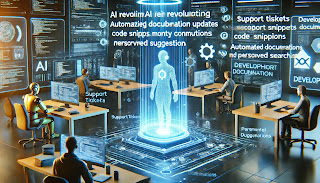The Future of Documentation: Can AI Do It Better?
In the ever-evolving world of technology, keeping developer documentation up-to-date is a challenging task. As products grow and change, maintaining accurate, relevant, and user-friendly documentation requires continuous effort. But what if artificial intelligence (AI) could revolutionize this process? The integration of AI into documentation workflows is not just a futuristic idea—it is happening now, and it's reshaping how teams manage their knowledge bases.
How AI Enhances Developer Documentation
AI has the potential to transform documentation by automating updates and improving content accuracy. Here are a few ways AI is making a significant impact:
1. Auto-Suggesting Documentation Updates
AI can analyze vast amounts of data from sources such as support tickets, community discussions, and even version control systems. By identifying recurring issues and frequently asked questions, AI can suggest relevant updates, ensuring that documentation addresses the real concerns of developers.
2. Identifying Gaps and Inconsistencies
By continuously scanning documentation against actual user queries and interactions, AI can detect inconsistencies, outdated information, and missing sections. This proactive approach helps documentation teams stay ahead of potential issues before they escalate.
3. Personalized Documentation Suggestions
AI-driven documentation tools can provide tailored recommendations based on individual developer needs. Whether it's suggesting specific code examples, troubleshooting steps, or best practices, AI can help create a more personalized and efficient developer experience.
4. Enhanced Search and Accessibility
AI-powered search engines within documentation platforms can deliver more relevant results by understanding context and intent. This means developers spend less time searching and more time implementing solutions.
Benefits of AI-Powered Documentation
Leveraging AI for documentation brings several advantages:
Increased Efficiency: Automating routine updates allows documentation teams to focus on more strategic initiatives.
Improved Accuracy: AI minimizes human errors by cross-referencing multiple data sources for consistency.
Better Developer Experience: Up-to-date and relevant documentation enhances productivity and reduces frustration.
Cost Savings: Reducing manual effort in documentation maintenance translates to lower operational costs.
Challenges and Considerations
Despite its benefits, AI-driven documentation also presents challenges. Ensuring AI-generated suggestions align with human quality standards, avoiding information overload, and maintaining contextual accuracy are essential factors to consider. Human oversight remains crucial to validate and refine AI-generated content.
Conclusion: The Road Ahead
AI is undoubtedly playing a growing role in the future of documentation, making it smarter, more adaptive, and increasingly efficient. By leveraging AI tools, businesses can stay agile and responsive to developer needs, ultimately enhancing the overall developer experience.
As AI technology continues to advance, the collaboration between human expertise and machine intelligence will shape the next generation of documentation—making it more intuitive, relevant, and impactful than ever before.AI is undoubtedly playing a growing role in the future of documentation, making it smarter, more adaptive, and increasingly efficient. By leveraging AI tools like Doc-E.ai, businesses can stay agile and responsive to developer needs, ultimately enhancing the overall developer experience.


.jpg)
Comments
Post a Comment